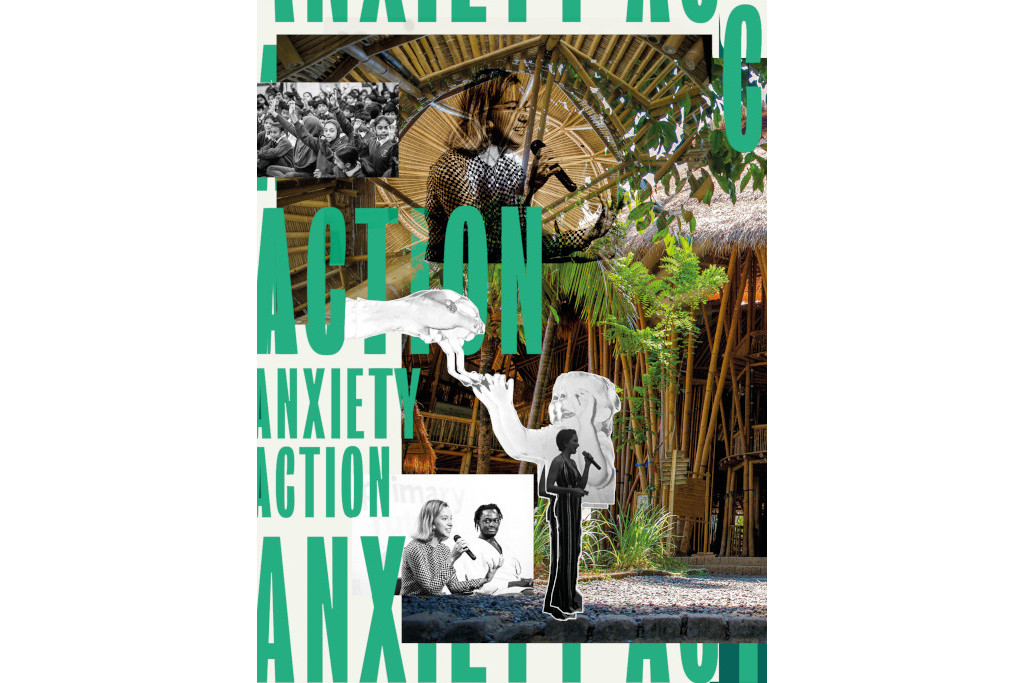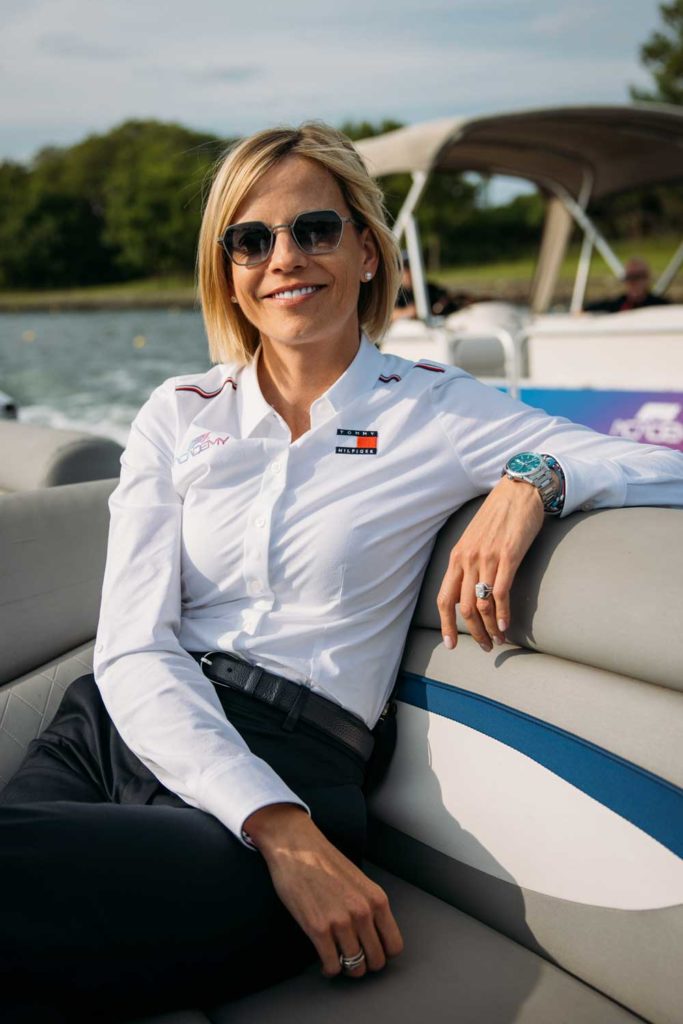Is Ecophobia Interrupting Your Story?
By
4 years ago
'I want to be able to look back on my life and know I did everything in my power to help others step up, rather than shut down.'

Activist Clover Hogan knows brands can play their part in the climate solution. But what she’s asking for is transformative thinking, not box ticking and greenwashing. Are you ready to rise to her challenge?
Clover Hogan: We Can Turn Eco-Anxiety into Action
Is Ecophobia Interrupting Your Story?
I’m a 22-year-old climate activist and have spent half my life trying to solve the climate crisis. Aged 11, I sat at my computer staring at scenes of million-year-old forests being bulldozed to produce Big Macs, dolphin hunts turning shorelines red and Al Gore’s graphs showing us how quickly we were devouring the Earth.
I simmered with anger, shock and sadness. Yet more than anything else, I felt confused. I didn’t learn about the climate or biodiversity crisis at school and we didn’t talk about it at the dinner table. The adults in my life seemed to be sleepwalking while the science told us we were hurtling toward a cliff.
At 13, I coerced my parents into moving to Bali so that I could study at the Green School, a tower of open air bamboo classrooms in the jungle. Unlike during my Australian education, the Green School didn’t ask me to pursue a ‘convenient career’. Instead, it asked me to focus on problems I wanted to solve.
So at 16, wearing a slightly too-big power suit, I travelled to Paris for the 2015 UN Cimate Change Conference (COP21) filled with starry-eyed optimism that world leaders would be uniting to solve this overwhelming threat. Instead, I met calcified men in better-fitting suits making empty promises. Leaders well practised in the art of greenwashing and setting targets far away enough that they required no immediate action. I attended sustainability forums sponsored by corporations such as BMW, Coca-Cola and Shell. It was like being at a conference on lung cancer, sponsored by Philip Morris.
I’d never felt so powerless. Looking at the people around me – anxious students, calculating policy-makers, cautious corporate leaders – I saw they felt the same. I almost resigned myself to the idea that the world was run by greedy people; that the rest of society didn’t care. It was back at Green School that my teacher introduced me to a word that would change the course of my life: ecophobia. Coined in 1996 by environmental educator David Sobel, he defined it as ‘the feeling of powerlessness to prevent cataclysmic environmental change’. The problem is not that we don’t care but that we’re not empowered to.
Imagine you’re a senior executive at a big multinational. In the 25 years you’ve been climbing the corporate ladder, your job has been to make money, deliver to shareholders, maintain the status quo and avoid risk. You share climate change articles on LinkedIn. You even became vegetarian after watching a documentary on industrialised farming.
Yet when you come home, you sense that your kids see you as the problem. They wish you were the climate change protestor chaining themselves to the glass tower – not the person looking down from its top floor. But you’re not a bad person. You’re ensnared within a culture that makes it fundamentally difficult to do the right thing.
When I ask leaders to describe the future they envision, it’s usually some techno-utopia full of flying cars, where deadly diseases are eradicated. When I ask eight-year-olds the same question, it’s a dystopian blockbuster of empty supermarket shelves and cities underwater.
![Clover Hogan. Working @ Volans w_ John Elkington [CREDIT_ Volans]](https://www.countryandtownhouse.com/wp-content/uploads/2021/10/Working-@-Volans-w_-John-Elkington-CREDIT_-Volans-V2.jpg)
Clover Hogan is challenging us to change our mindset and rewrite our stories
Climate scientists are brilliantly brainy, but the critical role of human psychology has been largely ignored in climate messaging. We’re wired for fight or flight, not ‘this is an enormous yet largely long-term, complex threat which requires our immediate action’. We’re more afraid of losing our short-term perks, from holidays to beef burgers, than we are of annihilating most of life on Earth, including ourselves.
Then, there’s the problem of how we talk about solutions. Regenerating nature is the most powerful climate mitigation tool we have. Yet climate solutions seem to be the stuff of science fiction. In 2021, Elon Musk tweeted that he’d be ‘donating $100m towards a prize for best carbon capture technology’ (as if trees didn’t already exist) and US climate envoy John Kerry claimed that, ‘50 per cent of the [carbon] reductions needed to get to net zero are going to come from technologies that we don’t yet have’.
It’s easy to be convinced that only techno-utopianism will ‘save us’ from the climate crisis, rather than going to the root of the cause: we’re so fixated on being above the rest of planetary life that our solutions to climate collapse are to double down on this divorce.
Our society is predicated on limitless growth within finite resources, promoting values like competition and consumption over connection and community. So, it’s less effort to envisage life on terraformed Mars than forge meaningful relationships with life on Earth.
Leaders of luxury brands are uniquely poised to drive change, because in many ways, luxury is superficially synonymous with sustainability: high-quality materials, craftsmanship and customers primed to pay a premium. Yet change in the luxury space is slow and incremental.
Why? First, because luxury brands are selling a lifestyle of hyperconsumption that is inherently unsustainable to an affluent elite. Some brands have gone to great lengths to maintain this image, even burning products to create exclusivity through scarcity. Meanwhile, they underpay workers and pollute local ecosystems via their manufacturing.
Leading with solutions requires a radical reframe, from ‘do less harm’ to ‘do more good’ – circularity, regeneration, creating just and equitable communities. In essence, brands need to rethink what their purpose is – and many are. Should it be to create a product? Or should it be to create a product that is a vehicle for solving a larger environmental and societal problem?

Illustration by Meg Dowson
The reality is that we won’t deliver the better world we all know is possible through ‘small shifts’. Sustainability in business is often perceived as a bureaucratic, box-ticking activity. Reduce emissions by a small increment: tick. Limit the amount of virgin plastic: tick. Improve the life cycle analysis: tick. These steppingstones are important but what’s needed here is big, transformative thinking that takes courage, curiosity, passion. We don’t have time for token solutions, incrementalism, or companies vying to be seen doing the right thing through greenwashing. And while the climate crisis may be the greatest threat we’ve faced as a civilisation, it could also be the biggest opportunity to improve how we live and innovate in the 21st century.
What if you were part of a groundswell movement that changed the meaning of luxury? What if the cost of a product accurately reflected the value of the materials, energy and human ingenuity that went into creating it, with intention and respect for the natural world and its diverse inhabitants?
Leaders across luxury brands have the opportunity to eliminate waste from every stage of the value chain and invest in cleaning up the waste that their products have created historically. Materials can now be harvested through regenerative practices, which sequester more greenhouse gasses than they emit. Craftsmanship, on which these brands stake their reputation, can be sourced from skilled frontline artisans, helping to support livelihoods and preserve culture.
We need more leaders with the courage to challenge themselves before the climate crisis reaches our doorsteps irreversibly. While the problems of the luxury industry may seem too big, or too complex, each one requires a solution; a solution delivered by a Someone. Like. You.
At 19, I founded Force of Nature, a social enterprise that has worked with students in over 50 countries. We mobilise mindsets for climate action: supporting young people to channel their eco-anxiety into agency, and decision-makers to shift from apathy to action. The secret is simple enough. We help people rewrite the stories they subscribe to about the world and their place in it.
Working with anxious 16-year-olds and cautious corporate leaders alike, we hear the same stories on repeat: ‘I’m just one in 7.8 billion people’; ‘I’m not smart enough’; ‘The system is too broken to change’… These kinds of stories paralyse us. Rewriting them is the most powerful thing we can do.
There’s a quote in Spiderman: ‘With great power comes great responsibility’. Yet what if the opposite is true? What if it’s really: With great responsibility, comes great power? Now, you’re not responsible for solving climate change, because that’s outside of your control. What you are responsible for is the thing inside your control. Indeed, the only thing that has ever been in your control – your mindset.
I’m only 22, but I want to be able to look back on my life and know I did everything in my power to help others step up, rather than shut down. When you look back on your own life, what do you want to see? What will your story be?
Clover Hogan is a climate activist and the founding Executive Director of Force of Nature, a youth nonprofit mobilising mindsets for climate action. cloverhogan.com
Featured image: Illustration by Meg Dowson



